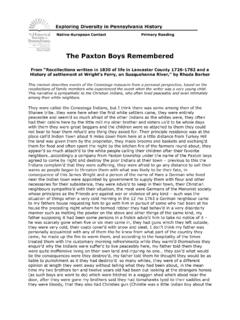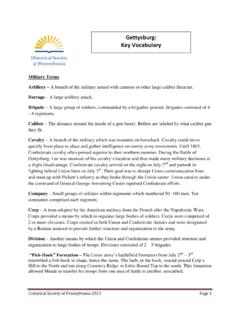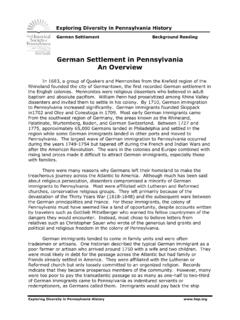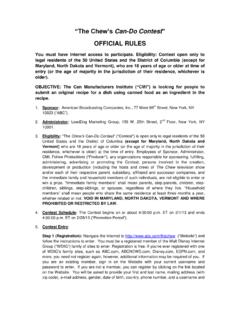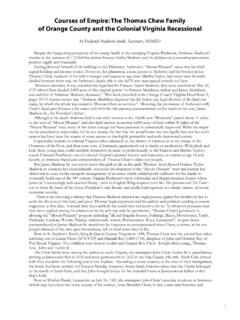Transcription of Chew Family Papers - Historical Society of Pennsylvania
1 2009 The Historical Society of Pennsylvania . All rights reserved. Collection #2050 chew Family Papers 1659-1986 848 boxes, 311 flat files, 36 rolls, lin. feet Contact: The Historical Society of Pennsylvania 1300 Locust Street, Philadelphia, PA 19107 Phone: (215) 732-6200 FAX: (215) 732-2680 Processed by: Cathleen Miller, Willhem Echevarr a, and Natalie Whitted Assisted by: Cary Majewicz, Heather Willever-Farr, Dean Williams, Heather Thomas, Jennifer Barr, Megan DiStefano, Kate Jacobs, Christina Elia, and Titus Moolathara Processing Completed: July 2009 Sponsor: National Endowment for the Humanities Restrictions: Collection is open for research. Related Collections at HSP: See Related Materials note within. 1 The Historical Society of Pennsylvania _____ chew Family Papers Creators: chew Family of Pennsylvania and Maryland 1659-1986 (bulk 1740-1930) 848 boxes, 311 flat files, 36 rolls, linear feet Collection 2050 _____ Abstract This extensive collection documents the lives of the Maryland and Pennsylvania branches of the chew Family through seven generations.
2 In addition to the collection s emphasis on the chew Family and their connections within Philadelphia s elite, the Papers provide a perspective on the lives of many of the Chews slaves and servants, and offer insights into Family relationships, women s history, health, religion, legal history, the Revolutionary and Civil wars, politics, trade, land management and settlement, surveying, industrialization, and the growth and development of the city of Philadelphia. The focus of the collection revolves around Benjamin chew , his son Benjamin Jr. and his offspring. Both father and son were influential lawyers, and together amassed large quantities of land in Pennsylvania , Maryland, Delaware, and New Jersey. Benjamin chew Jr. s land holdings and estate became a major point of contention within the Family after his death in 1844.
3 This dispute, which continued for over forty years, was devastating to the Chews Family relationships and fortune, and is a central focus of the collection. The collection is divided into twenty-nine series, with over half of these dedicated to individual Family members or Family groups. Other series document the Family s land holdings, Cliveden, their home in Germantown; the Family s genealogical research; and their substantial map collection. The materials range in date from the seventeenth through the twentieth century, but the richest documentation is on nineteenth century life in the mid-Atlantic region. The collection contains business and financial records, cartographic material, correspondence, ephemera, legal documents, personal Papers , and other materials created and collected by the Chews during the eighteenth, nineteenth and twentieth centuries.
4 Background note The history of the chew Family in America goes back to 1622, when John chew arrived in Jamestown, Virginia aboard the Charitie. Dr. Samuel chew (1693-1744), three generations removed from John, was born and lived in Maryland much of his life, residing at the Family estate of Maidstone in Herring Bay, Maryland; and afterward at Whitehall, in Duck Creek, Delaware. He and his Family also lived in Dover and the Lower Counties (now Delaware), as well as in Philadelphia, Pennsylvania . Dr. chew received training in law and medicine, eventually acting as a doctor in Kent County, Delaware, and later as the chief justice of the Supreme Court of the Lower Counties. In 1715, he married Mary Galloway (1697-1734) and after her death, he married Mary Paca Galloway (d. 1746), the widow of his brother-in-law.
5 2 The Historical Society of Pennsylvania The two marriages resulted in five children who lived to adulthood: Elizabeth; Ann; Benjamin; Samuel, who lived in Chestertown, Maryland, administering the Family s farms and plantations; and John, who also lived in Chestertown, working as a merchant. Both of these men kept up with the Philadelphia branch of the Family through frequent correspondence and occasional visits. Dr. Samuel chew is perhaps best known for his challenge of the Quaker meeting in Duck Creek. Refusing to accept the meeting s criticism of his daughter s 1740 marriage to a non-Quaker, and their censure of his grand jury charge encouraging the taking up of arms as a means of defense, chew was eventually expelled in 1742. In response, he authored an advertisement sent to the Pennsylvania Gazette but never published, in which he admonished the Quakers for denying him the same liberty of conscience that they clamored for.
6 As a result of this rift with the Duck Creek Meeting, Samuel chew and his descendents broke from the Quaker faith, joining the Anglican and, later, the Episcopal Church. Chief Justice Benjamin chew (1722-1810) was the only surviving son of Dr. Samuel chew and his first wife, Mary Galloway. Born in Anne Arundel County, Maryland, he would eventually serve as recorder of Philadelphia, attorney general, recorder-general, and chief justice of the Supreme Court of Pennsylvania under the colonial government. After the Revolution, he was selected as the president of the High Court of Errors and Appeals. His 1747 marriage to Mary Galloway (1729-1755), produced four surviving children: Mary, Anna Maria, Elizabeth, and Sarah. His second marriage, in 1757, to Elizabeth Oswald (1734-1819), brought forth eight more children: Benjamin Jr.
7 , Margaret (Peggy), Juliana, Henrietta, Sophia, Maria, Harriet, and Catherine (Kitty). chew s children increased the social status of the Family through marriages to members of the Banning, Carroll, Galloway, Howard, Nicklin, Phillips, Tilghman and Wilcocks families. Tutored in the classics during his early years by Francis Alison, the elder Benjamin began his law studies at the age of fifteen, under the guidance of Andrew Hamilton, and concluded his formal education in 1744 at Middle Temple in London. Returning home upon the death of his father, he moved to Delaware, where he quickly became enmeshed in the political and legal affairs of Pennsylvania and the Lower Counties. His first appointment was as a representative to the Lower Counties Assembly. Soon thereafter, he was chosen to act as a representative of the Penn Family , assigned as secretary to the commission charged with settling the long-standing border dispute between Pennsylvania and Maryland.
8 Thus chew became intimately involved in legal proceedings that eventually resulted in Mason and Dixon s survey of the boundary line. In addition, Benjamin chew represented the colonial government in negotiating Indian treaties at Easton. In the mid-1750s, he was granted the post of attorney general for both Pennsylvania and Lower Counties, while also serving as the latter s speaker of the Assembly. chew moved to Philadelphia in 1754 and built a successful private law practice to augment his public service career. As his various employments and enterprises flourished, chew prospered, rising to the upper class in his adopted city. chew owned an elegant town house on South 3rd Street. Here, he attended St. Peter s Church and associated with many influential people in the city.
9 He became involved in other business interests, including iron works and land speculation. 3 The Historical Society of Pennsylvania As a result of his close relationship with the Penn Family , in 1774, Benjamin chew was chosen to succeed his friend William Allen as chief justice of Pennsylvania . With the growth of tensions between the colonies and Great Britain, chew at first supported the colonial cause but as the conflict became more intense, he did not advocate separation from England. His close ties to the proprietors and his unwillingness to support the revolution led to the loss of his government positions and banishment, with Governor John Penn, to Union Forge in New Jersey from 1777 to 1778. During this time, he kept up regular correspondence with his Family . In 1777, the British occupied Cliveden, chew s country house, which became a main stage of the Battle of Germantown in October of 1777.
10 Cliveden had been sold before the revolution, but was repurchased by the Family in 1797, later becoming the center of the chew Family s activities. Upon Benjamin chew s return to Philadelphia, he increased his land purchases, ultimately acquiring extensive property holdings in Pennsylvania , adding to inherited properties in Maryland, New Jersey, and Delaware. In 1791 he was appointed by Governor Thomas Mifflin to head the High Court of Errors and Appeals for the state of Pennsylvania , a position he held until 1806. At the end of his life, in 1810, Benjamin chew had amassed a sizable fortune from land speculation and his legal practice. Benjamin chew s son Benjamin Jr. (1758-1844) had become increasingly involved in his father s affairs, practicing law with him, and managing the elder Benjamin s land holdings, ultimately taking responsibility for the Family s plantations and the purchase and sale of slaves.

